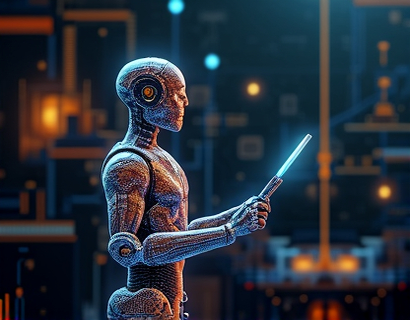Unlocking Digital Transformation: Leveraging AI and Crypto for Next-Gen App Solutions
The digital landscape is undergoing a profound transformation, driven by the convergence of artificial intelligence (AI) and cryptocurrency technologies. This merging of advanced computational powers and decentralized financial systems is redefining how applications are developed, deployed, and experienced by users. The integration of AI and crypto is not just a technological trend but a fundamental shift in the way we interact with digital solutions, promising enhanced efficiency, security, and user experiences. This article explores the transformative potential of this union, examining how these technologies are reshaping the future of app development and digital interactions.
The foundation of this digital revolution lies in the unique capabilities of AI and crypto. AI, with its ability to process vast amounts of data, learn from patterns, and make intelligent decisions, is revolutionizing app functionality. It enables applications to offer personalized experiences, predictive analytics, and automated processes that were once unimaginable. On the other hand, cryptocurrency, built on blockchain technology, introduces a new paradigm of secure, transparent, and decentralized transactions. When combined, these technologies create a powerful synergy that can unlock new possibilities in app solutions.
Enhanced Security through Blockchain
One of the most significant advantages of integrating blockchain into app solutions is the enhancement of security. Blockchain's decentralized and immutable ledger ensures that data transactions are secure and tamper-proof. This is particularly crucial in applications handling sensitive information such as financial data, personal identification, and health records. By leveraging blockchain, apps can provide users with a higher level of trust and security, reducing the risk of data breaches and fraud.
For instance, in the realm of financial apps, blockchain can facilitate secure and transparent transactions without the need for intermediaries. This not only reduces costs but also speeds up transaction times. Moreover, smart contracts on the blockchain can automate and enforce contractual obligations, ensuring that all parties adhere to agreed terms. This level of security and automation is a game-changer for industries ranging from finance to supply chain management.
Personalization and User Experience with AI
AI plays a pivotal role in enhancing user experience by enabling highly personalized interactions. Through machine learning algorithms, apps can analyze user behavior, preferences, and patterns to deliver tailored content and services. This personalization extends beyond simple recommendations to include adaptive interfaces, context-aware notifications, and intelligent assistance. Users benefit from a more intuitive and efficient interaction with apps, leading to higher satisfaction and engagement.
For example, in e-commerce platforms, AI can analyze a user's browsing and purchasing history to suggest products that align with their interests. In health and fitness apps, AI can monitor user activity and provide customized workout and nutrition plans. These personalized experiences not only improve user satisfaction but also increase the likelihood of user retention and loyalty.
Efficient Backend Operations with AI
Beyond enhancing user experience, AI also optimizes the backend operations of apps, making them more efficient and scalable. AI-driven analytics can process large datasets to identify trends, predict user behavior, and optimize resource allocation. This data-driven approach allows developers to make informed decisions, streamline processes, and improve app performance. For instance, AI can predict server load and automatically scale resources to handle traffic spikes, ensuring a seamless user experience even during peak times.
Additionally, AI-powered chatbots and virtual assistants can handle a wide range of user queries and support tasks, reducing the burden on human support teams. These AI assistants can operate 24/7, providing instant responses and resolving issues efficiently. This not only enhances user satisfaction but also reduces operational costs for app providers.
Decentralized Applications and Cryptocurrency
The integration of cryptocurrency and blockchain extends to the development of decentralized applications (dApps), which operate on blockchain networks rather than centralized servers. dApps leverage the transparency and security of blockchain to create trustless environments where users can interact without intermediaries. This decentralization opens up new possibilities for app development, particularly in areas such as social media, gaming, and decentralized finance (DeFi).
In the context of dApps, cryptocurrency serves as a medium of exchange, incentivizing users to participate and contribute to the network. For example, in decentralized gaming platforms, players can earn tokens for completing tasks or achieving milestones, which can be used to purchase in-game items or traded with other users. This token-based economy fosters a more engaging and rewarding user experience, encouraging active participation and community building.
DeFi is another area where the combination of AI and crypto is making waves. Decentralized financial services offer users greater control over their assets and financial transactions, all while benefiting from AI-driven insights and automation. From lending and borrowing platforms to decentralized exchanges, DeFi applications are redefining the financial landscape, making it more accessible and inclusive.
Interoperability and Ecosystem Integration
The true potential of AI and crypto in app solutions is realized through interoperability and ecosystem integration. As more apps adopt blockchain and AI technologies, the need for seamless interaction between different platforms and services becomes paramount. Interoperability ensures that users can seamlessly transition between apps and services, enjoying a cohesive and integrated digital experience.
Blockchain protocols and AI algorithms can work together to create standardized interfaces and protocols that facilitate interoperability. For instance, cross-chain bridges enable different blockchain networks to communicate and transfer assets, while AI can optimize these processes by predicting network conditions and adjusting parameters in real-time. This level of integration not only enhances user convenience but also fosters innovation by allowing developers to build on existing ecosystems.
Challenges and Considerations
While the potential of AI and crypto in app solutions is vast, there are several challenges and considerations that must be addressed. One of the primary concerns is the regulatory landscape. The decentralized nature of blockchain and the innovative use of cryptocurrency raise questions about compliance, privacy, and legal frameworks. Developers and app providers must navigate these regulatory waters carefully to ensure their solutions are compliant and sustainable.
Another challenge is the technical complexity involved in integrating AI and blockchain. Developing applications that leverage these advanced technologies requires a high level of expertise and resources. Moreover, ensuring the scalability and performance of blockchain-based apps remains a technical hurdle that needs to be overcome. However, as the ecosystem matures, these challenges are likely to be addressed through advancements in technology and best practices.
Future Prospects
The future of app solutions lies in the continued convergence of AI and crypto, driving innovation and transforming digital interactions. As more developers and businesses recognize the benefits of these technologies, we can expect to see a surge in the adoption of blockchain and AI-driven apps. The integration of edge computing, 5G networks, and IoT devices will further enhance the capabilities of these applications, creating a more connected and intelligent digital world.
In the realm of enterprise, AI and crypto can revolutionize business processes by enabling secure, transparent, and efficient operations. For consumers, the impact will be felt through more personalized, secure, and engaging digital experiences. The potential for new business models and revenue streams is immense, as companies find ways to leverage these technologies to create value and differentiate themselves in a competitive market.
In conclusion, the merging of AI and crypto is not just a technological trend but a fundamental shift in how we approach app development and digital interactions. By harnessing the power of these advanced technologies, we can unlock new possibilities, enhance user experiences, and build a more secure and efficient digital future. As the ecosystem continues to evolve, the opportunities for innovation and growth are boundless.











































